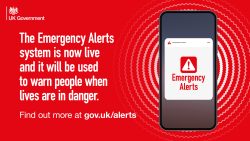Monthly archives: March 2023
Pressure Ulcer Prevention Study Day Cancelled
Unfortunately, due to a reduced Tissue Viability Service, the Pressure Ulcer Prevention Study Day on 30 March is now cancelled.
The Tissue Viability Team will be arranging another Pressure Ulcer Prevention Day and priority will be given to staff whose training has been cancelled.
National day of reflection: 23 March

On Thursday 23 March 2023, the ‘National Day of Reflection’ will mark the third anniversary of the first Covid-19 lockdown.
This annual awareness day was put in place to show support for the millions of people in the UK who’ve been bereaved during the coronavirus pandemic and to give everyone a chance to reflect on the lives of the people we’ve lost.
As a result of the pandemic, people from all walks of life have had to say goodbye to loved ones.
At a time that is already unimaginably hard, grief and trauma during the pandemic was exacerbated by restrictions. Families and friends were precluded from being with their loved ones in their final moments and the ability to grieve for them at a funeral or similar gathering was also taken away.
The ‘National Day of Reflection’ is a way for us, as a nation, to come together and acknowledge this lasting pain. With compassion and love, we can show those who are grieving that they are not alone.
To mark the National Day of Reflection colleagues are encouraged to take time to stop and show our support for each other, both now and in the years to come, observe a minutes silence or simply speak to someone about your experience.
Launch of public alert system

The new Emergency Alerts service is now live. The system will enable people to be contacted via their mobile phone if their lives are at risk in an emergency. The service will be used to warn you about life-threatening emergencies such as severe flooding.
Emergency Alerts are messages sent to all compatible 4G and 5G mobile phones when there’s a danger to your life, health or property in the area you’re located. They don’t need your location or phone number. Only the government and the emergency services can send them. If you don’t have a mobile, you’ll still be kept informed through other channels.
If you get an Emergency Alert on your phone, you’ll hear a loud, siren-like sound. A message on your screen will tell you about the emergency and how best to respond. You’ll be able to check an alert is genuine at gov.uk/alerts
To learn more about Emergency Alerts, look out for the nationwide information campaign and visit gov.uk/alerts
Iftar at Millers Restaurant: 28 March

The Muslim Liaison Group (MLG) are inviting colleagues to join in the celebrations for the annual Trust Iftar at Millers Restaurant, City on Tuesday 28 March.
Managers are encouraged to allow team members to rotate and come along to celebrate from 6.30pm. There will be a wide range of food and drink available. There is no need to book so please just come along and feel free to invite a colleague.
For more information please email anser.khan@nhs.net.
Chief Executive’s Message – Friday 17 March
Before I talk about the particular subject matter of the Midland Met development, I would like to say a few words about the planning and extraordinary effort put in by colleagues throughout the Trust, in response to the unprecedented strike action taken by non-consultant doctors this week. The strike action ran from 6.59am on Monday right through to 6.59am Thursday morning, a continuous 72-hour period. I think we learned or at least were reminded of a few things this week:
- Just how fundamentally reliant we are on doctors in training to provide core service cover during “unsocial hours”. We should never underestimate their contribution to keeping our services afloat.
- When one replaces less experienced doctors with more experienced ones, more definitive clinical decisions get made which benefit both the patients and the Trust. As an illustration, the last time we had so few patients awaiting admission in our emergency departments than on Tuesday morning, was Christmas Day seven years ago.
- When national communication and media coverage about this action is low key, the general public’s awareness of it is limited and so urgent care demand was still at normal or close to normal levels, on Monday.
- Our experience in the pandemic and over successive, increasingly difficult winters, has put our internal planning for such events onto a better footing. Likewise, our internal “critical incident” style command and control mechanisms and sharing of information.
- The vast majority of our senior clinical staff, be they medical or other professions, stepped up massively and without complaint, covered duties and roles which took them way out of their comfort zone, yet kept going in exhausting and trying circumstances.
I have been humbled by your response to this, this week. Our debrief sessions and capture of learning has already begun and I am sure this will prove instructive and may lead to some changes to assumptions we have made around the Midland Met care models, for example. All of that will come later. For now, to all of you involved in planning for and/or covering duties during the strike action, a heartfelt thank you from me, on behalf of the Trust Board. I sincerely hope that we don’t have to do this again. If we do, it will prove an even bigger test of our willpower and planning, I suspect.
Throughout the week, most corporate meetings were stood down to free up colleagues to support patient care during the period of industrial action. I did make exceptions for a small number of core meetings for the MMUH programme recognising the importance of progressing with our plans to safely open the new hospital in 2024. Apart from some key clinicians, the MMUH Programme Company team came together on Monday as one of a series of quarterly away days. This focus for this session was on defining critical success factors. Attendees spent time in their workstreams exploring what success for the hospital programme would feel like for our Patients, People and Population. The importance of all of us being able to understand and clearly articulate the benefits of Midland Met cannot be underestimated. It is #morethanahospital and as well as patients being cared for in a fit for purpose environment we are expecting patient outcomes to be improved, staff and patient experience to be better and enhanced integration and flow between community and acute services.
These benefits all have a financial gain too. Through some excellent work with partners PwC we are able to put a monetary value against the benefits we expect. Even taking a cautious approach, the investment of building this new facility will be more than covered over the lifetime of the hospital when we account for patient safety improvements (e.g. IPC), energy and old estate costs, sale of the City site, not to mention the longer term regeneration opportunities. As PwC draw their work to a close, we will be able to share these benefits with you so that you can see just how valuable Midland Met is for our health and social care systems and the wider economy.
Today I took James Morris MP round the building and we were able to talk to him about these benefits. James has been a long-term supporter and advocate of the new hospital and is as eager as you and I to see it open. Although not directly in his constituency he recognises how significant the development is for local people and businesses, as well as the patients who will be cared for within it.
We are Midland Met Newsletter – Issue 2
Welcome to the second of our regular colleague bulletins dedicated to all things Midland Met. It will share the latest news about the programme as we prepare to open the Midland Metropolitan University Hospital in Smethwick in 2024. The Trust Board has approved the establishment of a new temporary organisation, the Midland Metropolitan University Programme Company, to enable us to safely open the new hospital.
We’ll keep you informed as we continue on this journey to create #morethanahospital at SWB. Thank you for everything you’re doing and for your continued support.
Read the second issue of the We are Midland Met bulletin by clicking here.
Induction and onboarding process
A good quality induction and on-boarding experience is an essential part of making sure new starters receive a positive, welcoming experience and settle in quickly and easily. It also helps to ensure the Trust is able to retain the people we have invested in recruiting and training.
Our organisational data shows that a high number of colleagues leave within the first 2 years of service, often quoting a lack of support, training and guidance within the first weeks/months of service as a contributory factor.
Our new induction and onboarding framework sets out the key points of contact that managers should have with new starters throughout the induction and on-boarding process; from the point of formal conditional offer, through to the first anniversary of starting in post and beyond.
The new local induction and onboarding checklist details the specific actions to be taken by managers throughout this process to ensure the individual has a welcoming and thorough local induction.
We have also created an electronic New Starters Induction Handbook, which will be provided to all new starters when they join. This contains key information about working for the Trust and complements the information they will receive via the New Starters Welcome page and Corporate Welcome.
In addition, a ‘Local Induction Information Pack’ template has been created for departments/directorates to use to develop your own local induction information for new starters. This is intended to complement, not duplicate the corporate New Starters Induction Handbook.
Our new ‘Manager’s New Starter Induction Help Page’ on Connect contains all the information and templates managers need to help your new starter settle in: https://connect2.swbh.nhs.uk/learning-development/managers-new-starters-induction-help-page/
Managers are reminded that the completed induction and onboarding checklist (Parts 1-3) and medical devices form must be submitted to ESR: swbh.esrhelpdesk@nhs.net at the end of the first week in service for monitoring purposes.
Drug safety notice: Ciprofloxacin 400mg in 200ml solution for injection
There are limited supplies of some brand of ciprofloxacin 400mg in 200ml solution for injection until early April.
We ask clinical colleagues be judicious with intravenous ciprofloxacin to preserve stock for patients who require it.
Please see Ciprofloxacin 400mg in 200ml solution for injection for further details.
For more information please contact the pharmacy department on ext. 5263/3783.
Are you using the correct sample container when sending a specimen to Microbiology?
Since the microbiology labs have moved to BCPS Wolverhampton, the department are experiencing an increase in the number of rejected specimens due to collection of samples in a wrong container.
This subsequently leads to delays in diagnosis and treatment of patients, resulting in an increase of antibiotics use and length of stay. This then has a negative impact on patient flow, infection control management and delays care and decision making. It also has a considerable cost to the laboratories due to wastage of resources such as staff time, equipment as well as consumables such as specimen containers and request forms.
Please see Which container help sheet as a reminder of the common swabs and samples pots used in microbiology.
Disco night for adults with physical and learning disabilities

A disco and boogie night for adults with physical and learning disabilities will be held at Harborne Village Social Club (3 Serpentine Road, Harborne, B17 9RD) on Wednesday 29 March, 7pm – 10pm. Click here to find out more.
For more information please email call 07401341306 or email inclusivedisco330@gmail.com.
← Older items Newer items →